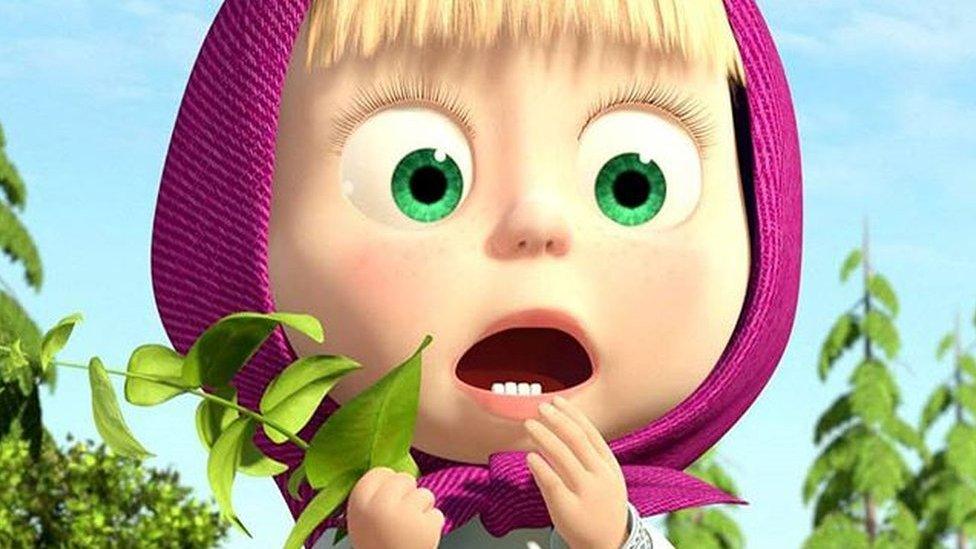France election: North-east voters are in cynical mood
- Published
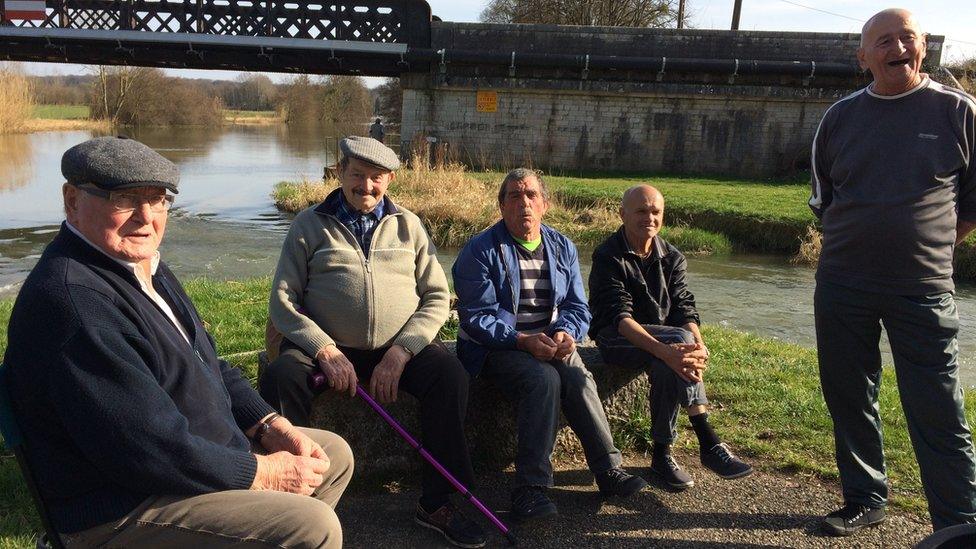
The forthcoming election doesn't inspire these fishermen who can't see the point of voting
To find out what French voters make of their forthcoming presidential election I am following the route of the Tour de France, testing the mood in towns along the way.
A thick barricade of black clouds has descended over Longwy in north-eastern France this morning. The sun, knowing it's beaten, has retreated so fully that at midday it already feels like dusk.
Yet, despite the lack of light, the Art Deco stained glass windows along the staircase of what used to be the administrative headquarters of the local steel industry, are quite brilliant.
"That used to be me," says Dominique Dimanche, pointing to an image of bare-chested men stoking the furnace.
"These windows were designed in homage to the men of the foundries.
"Can you believe that this is all that's left now of Longwy's history as the lynchpin of France's steel industry?"
His friend, photographer Philippe Pia-Santini, rolls his eyes.
"They've deliberately erased Longwy's history," he says. "They don't want anyone to remember what we were."
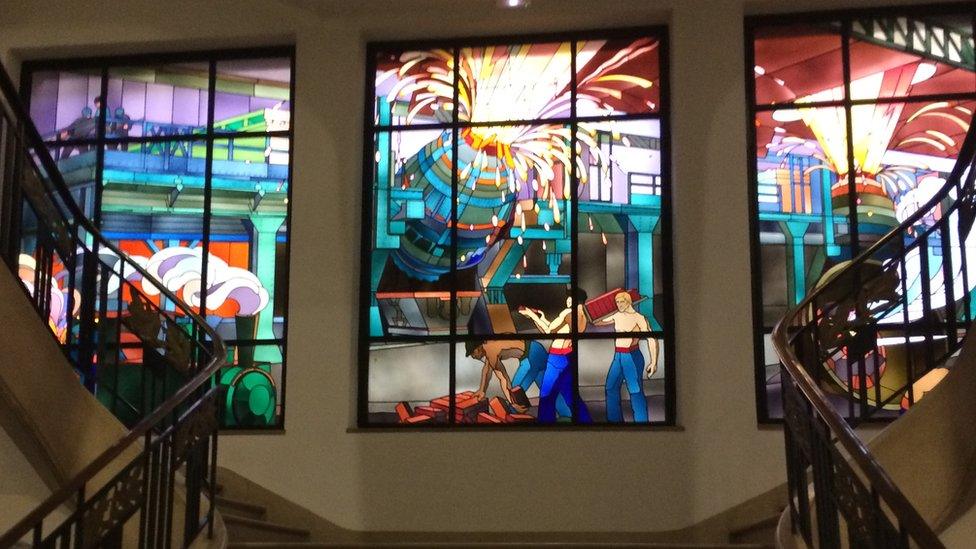
The Art Deco stained glass windows in Longwy were built as a tribute to the men working in France's steel foundries
Longwy used to be a thriving industrial town with four steel plants and factories. But at the end of the 1970s the French government announced it was ceasing production and closing all the factories.
Ironically, the building in which we are now standing houses the job centre.
"There were pretty violent riots in Longwy when the steel works closed," Philippe explains.
"Lots of the foremen became Communist councillors and for a long time we had a Communist mayor. We were known as Red Longwy."
It's clear that Longwy has never bounced back from the shock of its steel plant closures.
Shops and commerce quickly moved up the hill to the more prestigious Longwy Haut, with its classified Unesco monuments, leaving Longwy Bas, the lower part of the town, very much at the bottom of the heap.
At the side of the road leading out of Longwy a small group of protesters from local unions struggle to keep their fire alight as the hailstones batter down.
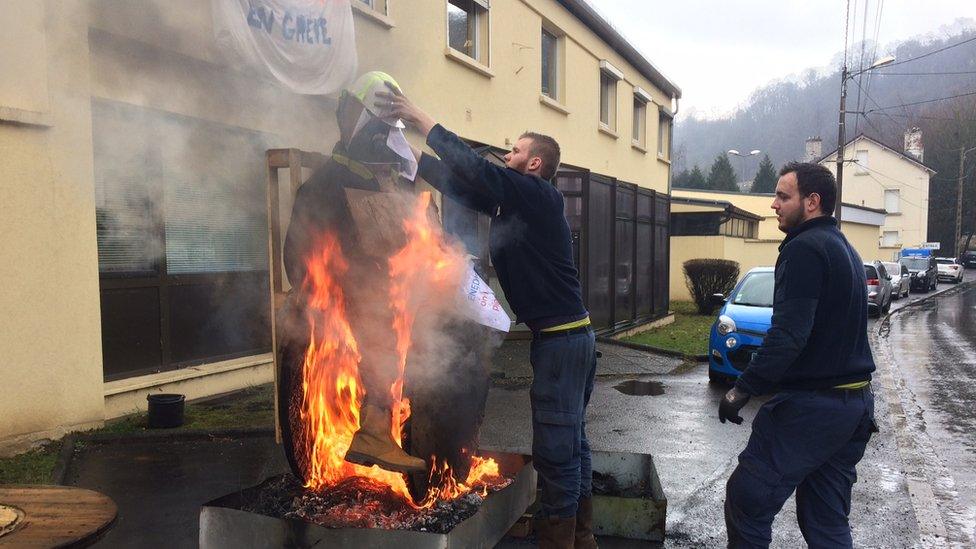
Local unions in Longwy have been protesting over low wages
Their banner reads "More Purchasing Power!". When I stop to chat to them, they all tell me they are struggling to get their salaries to stretch to the end of the month.
According to the national institute for statistics, Insee, one in seven families in this deindustrialised Moselle region are living below the poverty line of less than 1,000 euros (£870) a month.
I happen to be in town the day that the French prime minister Bernard Cazeneuve is making a visit to the town hall, which is currently in the hands of his ruling party, the PS, or Socialist Party.
A few people spill out of the bars to watch his arrival but no-one claps.
"Moron," mutters a lady stepping round the puddles in her slippers.
"What's he come for? Is he going to stop this place dying on its feet? Of course not. Neither left or right do anything here."
She winks at me.
"I won't say for whom I'll be voting this time, because I don't think people like to hear the name. But let's just say the direction will be right. I'll definitely be going right."
Three hours drive to the south is Troyes and as I get on my bike to explore the town, I feel like I've entered a fairy tale.
Here is the glorious France of yesteryear, 16th Century timber-framed, pastel-coloured houses, narrow cobbled streets and a plethora of imposing churches.
But it's certainly an image of the country - traditional, white and Catholic - for which many people are nostalgic.
It was provincial Catholics who helped the socially conservative Francois Fillon win the primary race to become the presidential candidate for the centre-right Republican party.
When I quiz some elderly parishioners after Mass, they all admit that the question of national identity bothers them.
"It's a big subject, dear," says Dominique as she puts away her payer book.
"But I can summarise it quickly for you: national identity in France no longer exists."
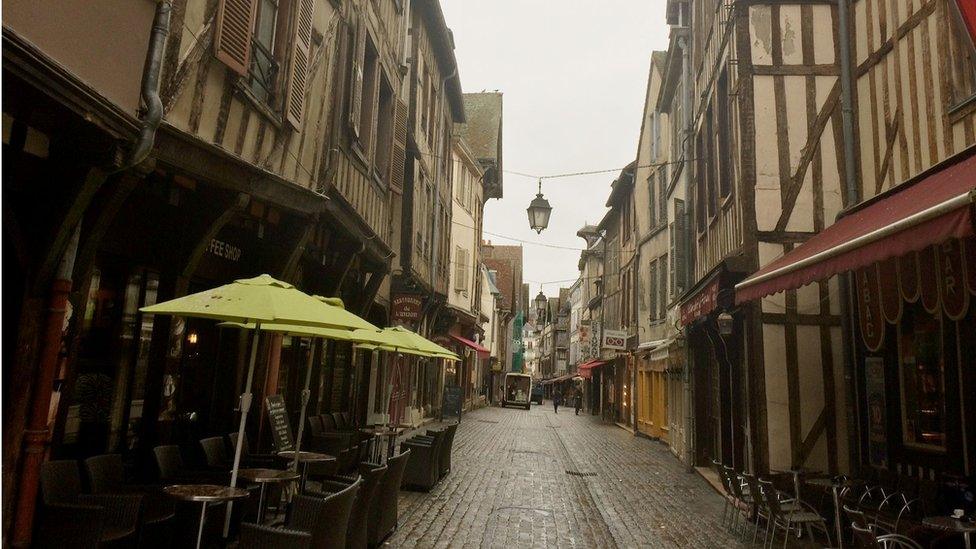
Troyes has a traditional "chocolate box" feel with narrow streets and pastel-coloured buildings
It is illegal in France to hold a census based on ethnicity or religion but five minutes spent in Troyes will show you that the town is very ethnically mixed.
Several kebab and couscous restaurants sit under the eaves of the timber-framed houses alongside the bistros and patisseries.
"This is France today," laughs PE teacher Sabrina, who is taking her pupils to see a multicultural circus act at the local theatre.
"We are a country based on many different cultures."
Preserving a "national identity" has long been the discourse of the National Front (FN) but following the 2005 riots in France's poor and largely immigrant suburbs, the then interior minister, conservative Nicolas Sarkozy, controversially launched a countrywide debate on national identity.
The recent attacks in Paris and Nice have pushed national identity back into the forefront of the mainstream political agenda. Most of the attackers had North African roots but were French citizens.
At Troyes' funfair, a few families are braving the rain. Salesman Karim and his care assistant wife Sarah, who wears a hijab, push their children in strollers.
"We don't know what it means to be French any more," Karim tells me bitterly.
"Because you can be born here like us, pay your taxes like us and have republican values like us but these days, when it comes to politics, there's something about us that doesn't quite stick. We are just not accepted as genetically French."
"But we are French," insists his wife.
"Just because I wear this headscarf, it doesn't mean I'm not French."
Karim pulls himself up straight.
"I feel French and I am French and I'm a Muslim. And this is just as much my home as it is for Pierre, Paul or Jacques."
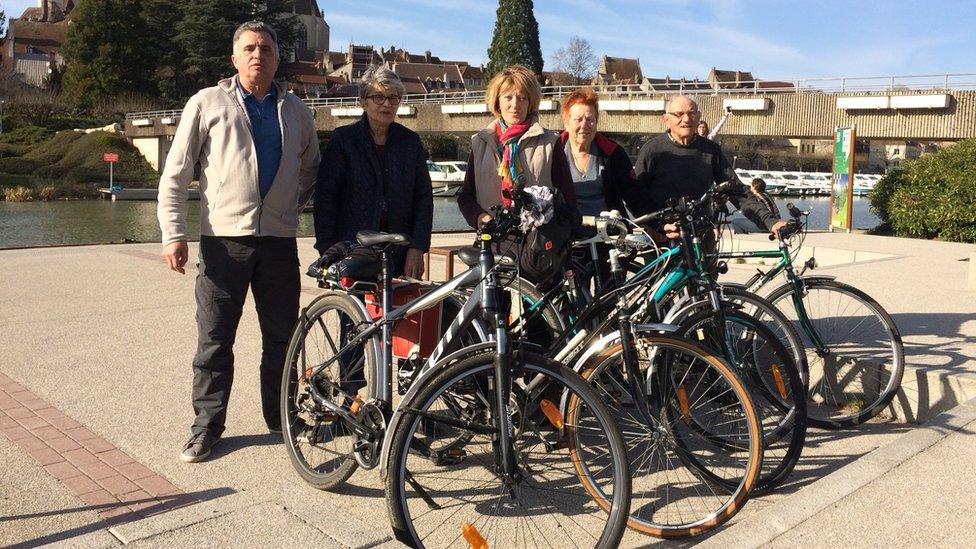
These cyclists laughed at the idea of voting and said there was no-one they would vote for
The sun is out as I ride along the canal at Dole, 200km (125 miles) south-east of Troyes, and fellow bikers ring their bells and wave as they pass.
On a bench, taking a pause for water, a group of five retired cycling friends laugh when I ask them for whom they'll be voting this April.
"No-one!" shout the women in unison.
"Why would we bother voting for any of these crooks?" says Micheline.
"I've voted all my life but not this time, there's no point. There's been scandal after scandal in this campaign."
"I have no wish to vote either," agrees her friend Stella. "The choice is too difficult."
Further up the bank, a group of elderly men are wondering whether they've got the energy to fish today.
I ask them if they've got the energy to go to the ballot boxes next month and they bawl me out.
"We've had empty promises all our life!" yells one. "We don't believe in politicians any more. So why vote?"
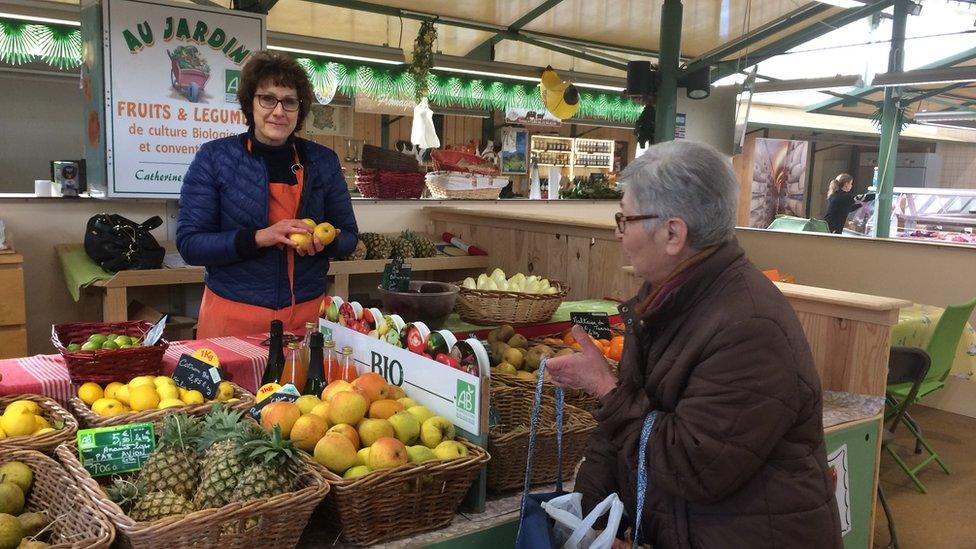
Market trader Catherine believes politicians are out of touch with how people live in towns like Dole
The wind coming from the Jura mountains is biting in the early morning as I watch the stallholders setting up at Dole's market.
Cheap clothes and plastic toys make up most of the produce. I can see no price tag anywhere more than 20 euros (£17).
"That should tell you something," says Catherine, who runs the fruit and vegetable stall.
"Everyone here gets up at the crack of dawn to eke out a living but most people's takings are way down."
She offers me an apple.
"It's interesting this tour of France you're doing," she muses.
"Finding out about ordinary people. Because our millionaire politicians haven't got a clue how we live in places like this. For them, we don't even exist. Sometimes I wonder what they do all day, these bigwigs in Paris."
She looks at me curiously.
"What is the point of our politicians?" she asks me innocently as I bite into the apple.
You can hear Emma Jane Kirby's radio reports as she tours France on BBC Radio 4's PM programme
- Published3 May 2017
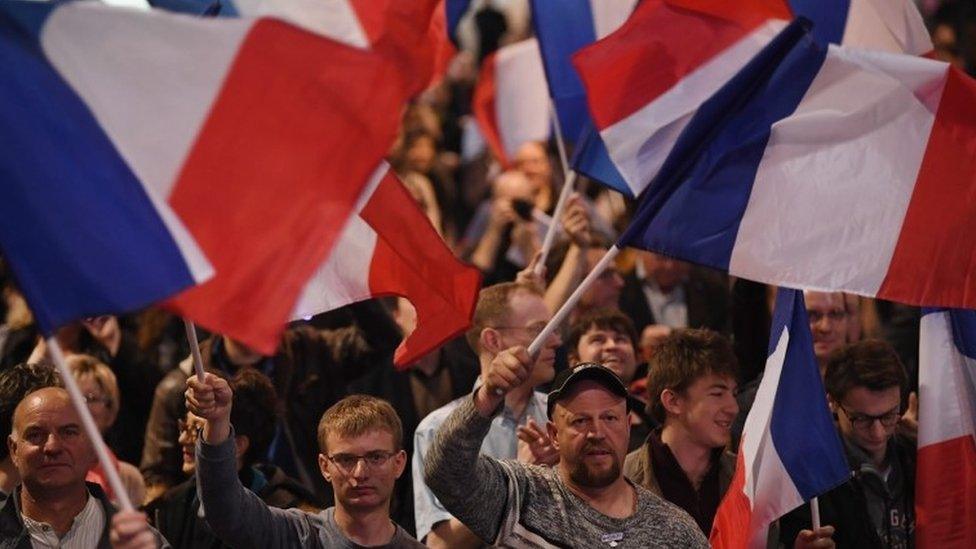
- Published24 April 2017
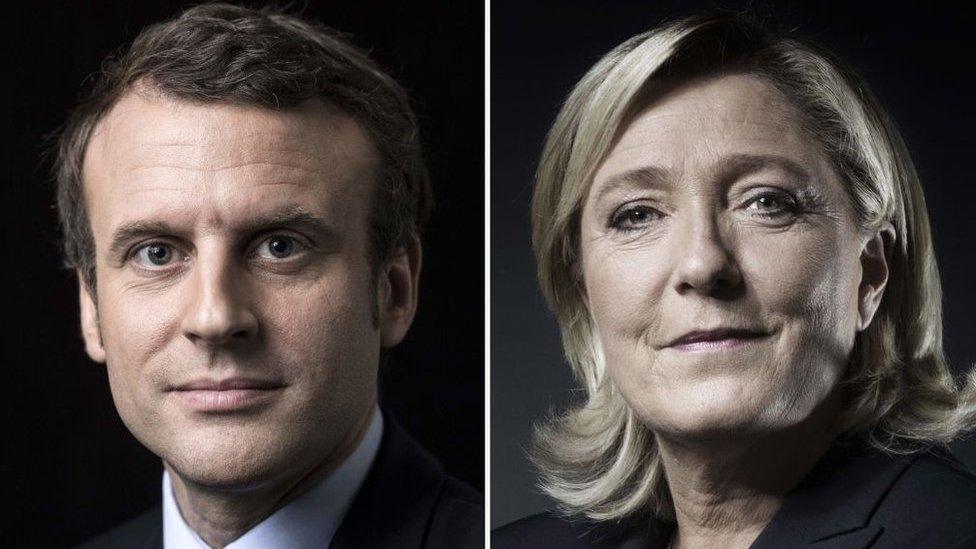
- Published15 March 2017
